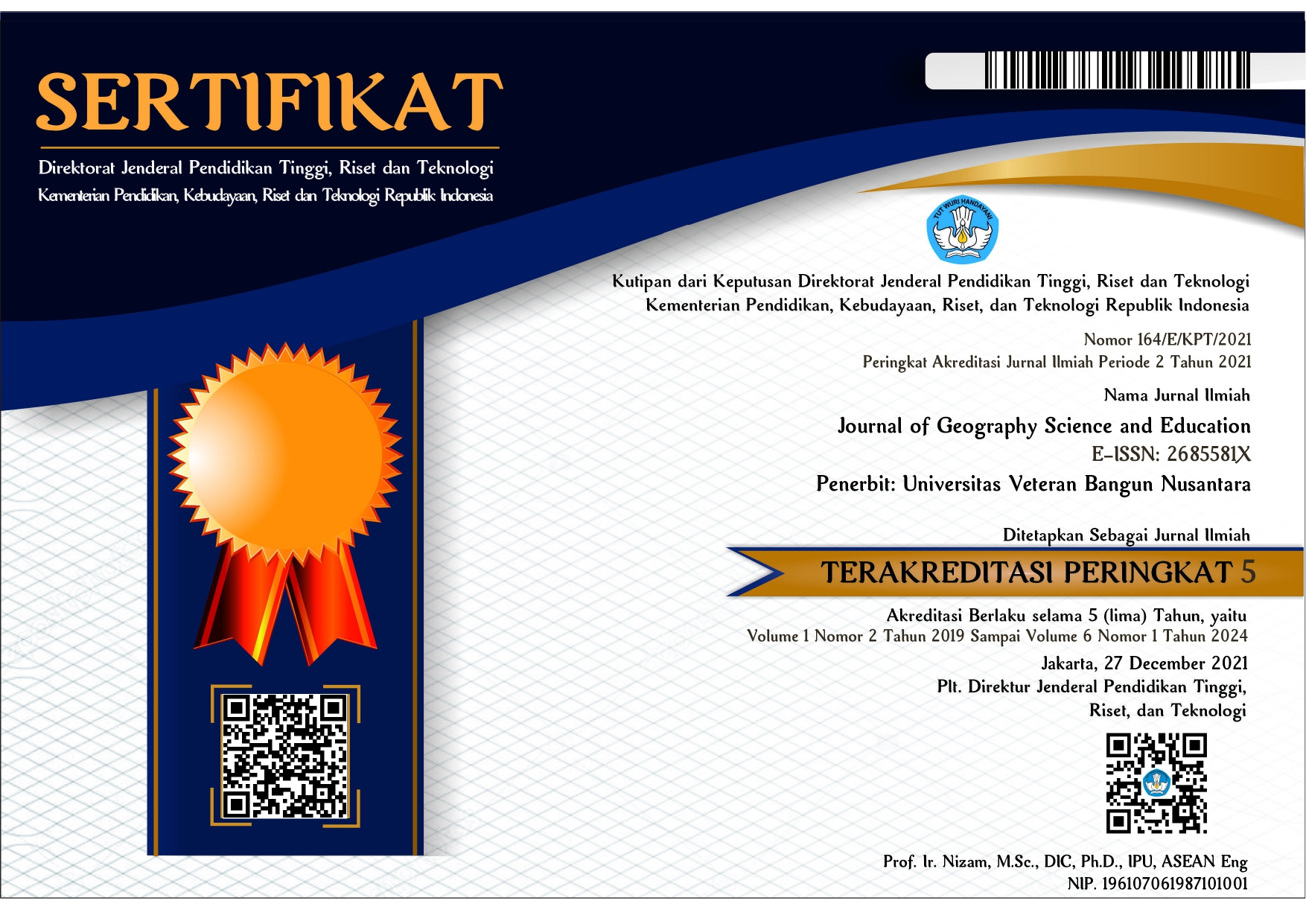The effectiveness of the team quiz type cooperative learning model on the learning outcomes of class XI students in geography subjects at SMAN 4 Palu
DOI:
https://doi.org/10.32585/jgse.v7i1.6377Abstrak
Penelitian ini bertujuan untuk mengetahui pengaruh model pembelajaran kooperatif tipe Team Quiz terhadap hasil belajar siswa di SMA Negeri 4 Palu. Penelitian ini menggunakan metode penelitian kuantitatif dengan jenis penelitian Quasi Eksperimental. Teknik pengumpulan data yang meliputi observasi, tes, dan dokumentasi untuk menentukan hasil belajar siswa dengan menggunakan model pembelajaran kooperatif tipe kuis tim. Sampel penelitian terdiri dari dua kelas, yaitu kelas eksperimen yang menerapkan model Kuis Tim dan kelas kontrol yang menggunakan metode pembelajaran Diskusi. Data dikumpulkan melalui tes hasil belajar yang dilakukan sebelum dan sesudah penerapan model pembelajaran. Analisis data dilakukan dengan tes (t-test) untuk membandingkan hasil belajar kedua kelompok. Hasil penelitian ini menunjukkan bahwa penerapan model pembelajaran kooperatif tipe kuis tim berpengaruh terhadap hasil belajar siswa kelas XI Geografi di SMA Negeri 4 Palu.
Unduhan
Unduhan
Diterbitkan
Cara Mengutip
Terbitan
Bagian
Lisensi
Hak Cipta (c) 2025 Sitti Nurhaliza, Haslita Rahmawati Hasan, Ika Listiqowati, Suwarni

Artikel ini berlisensiCreative Commons Attribution-ShareAlike 4.0 International License.
License and Copyright Agreement
In submitting the manuscript to the journal, the authors certify that:
- They are authorized by their co-authors to enter into these arrangements.
- The work described has not been formally published before, except in the form of an abstract or as part of a published lecture, review, thesis, or overlay journal. Please also carefully read JGSE's Posting Your Article Policy at http://pubs2.ascee.org/index.php/ijele/about/editorialPolicies#custom-5
- That it is not under consideration for publication elsewhere,
- That its publication has been approved by all the author(s) and by the responsible authorities – tacitly or explicitly – of the institutes where the work has been carried out.
- They secure the right to reproduce any material that has already been published or copyrighted elsewhere.
- They agree to the following license and copyright agreement.
Copyright
Authors who publish with Journal of Geography Science and Education agree to the following terms:
- Authors retain copyright and grant the journal right of first publication with the work simultaneously licensed under a Creative Commons Attribution License (CC BY-SA 4.0) that allows others to share the work with an acknowledgment of the work's authorship and initial publication in this journal.
- Authors are able to enter into separate, additional contractual arrangements for the non-exclusive distribution of the journal's published version of the work (e.g., post it to an institutional repository or publish it in a book), with an acknowledgment of its initial publication in this journal.
- Authors are permitted and encouraged to post their work online (e.g., in institutional repositories or on their website) prior to and during the submission process, as it can lead to productive exchanges, as well as earlier and greater citation of published work.
Licensing for Data Publication
Journal of Geography Science and Education use a variety of waivers and licenses, that are specifically designed for and appropriate for the treatment of data:
- Open Data Commons Attribution License, http://www.opendatacommons.org/licenses/by/1.0/ (default)
- Creative Commons CC-Zero Waiver, http://creativecommons.org/publicdomain/zero/1.0/
- Open Data Commons Public Domain Dedication and Licence, http://www.opendatacommons.org/licenses/pddl/1-0/
Other data publishing licenses may be allowed as exceptions (subject to approval by the editor on a case-by-case basis) and should be justified with a written statement from the author, which will be published with the article.
Open Data and Software Publishing and Sharing
The journal strives to maximize the replicability of the research published in it. Authors are thus required to share all data, code or protocols underlying the research reported in their articles. Exceptions are permitted but have to be justified in a written public statement accompanying the article.
The associated persistent identifiers (e.g. DOI, or others) of the dataset(s) must be included in the data or software resources section of the article. Reference(s) to datasets and software should also be included in the reference list of the article with DOIs (where available). Where no domain-specific data repository exists, authors should deposit their datasets in a general repository such as ZENODO, Dryad, Dataverse, or others.
Small data may also be published as data files or packages supplementary to a research article, however, the authors should prefer in all cases a deposition in data repositories.










